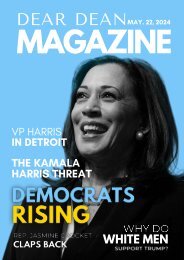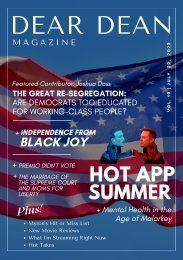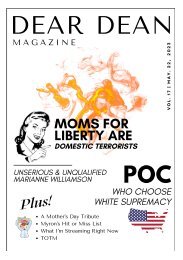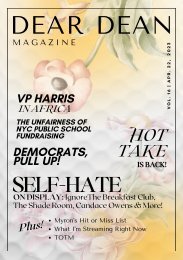Dear Dean Magazine: September 2023
Dear Dean Magazine: Issue 21 | September 2023 By Myron J. Clifton | Subscribe free online www.deardeanpublishing.com/subscribe
Dear Dean Magazine: Issue 21 | September 2023 By Myron J. Clifton | Subscribe free online www.deardeanpublishing.com/subscribe
You also want an ePaper? Increase the reach of your titles
YUMPU automatically turns print PDFs into web optimized ePapers that Google loves.
F E A T U R E D : J O S H U A D O S S<br />
Mcghee have been quoted saying “we would not have not<br />
have had a financial crisis if it weren't for racism”, and she's<br />
right. Racism breeds policy blind spots and economicmalpractice<br />
that hurt white people too.<br />
When we tell the story of debt-burdened white Americans<br />
struggling to pay back their college loans or overwhelmed<br />
white parents looking to save for their child's college fund,<br />
we're always certain to mention the inflated costs of<br />
college. What we often fail to mention is how it got this<br />
way. In the 1950’s, 60’s, and 70’s, millions of families sent<br />
their kids to college debt free through public investment.<br />
Not only did folks leave universities without debt, this<br />
well-educated workforce became the strongest middle<br />
class the world had ever seen. Economists have found for<br />
every tax dollar spent on free college under the G.I. bill, the<br />
American economy saw a $7 return on investment . This<br />
meant an economy where a bartender and a maid had<br />
access to homeownership, retirement accounts, vacations,<br />
weekends, and economic mobility. So, what happened?<br />
Fueled by the racist reactions to the federal government’s<br />
order for states to racially integrate their colleges, white<br />
voters began supporting policies that effectively cut public<br />
funding to keep Black students, who were<br />
disproportionately poor, from clearing the financial<br />
requirements to attend their universities. The result was a<br />
tripling of college tuition and a $1.77 trillion tax payer<br />
debt–a burden shared by white families all across America.<br />
Racism breeds sloppy governance that hurts white people<br />
too.<br />
From racially-biased and inflated criminal justice<br />
systems that require American taxpayers $300 billion<br />
a year, to discriminatory lending practices restricting<br />
Black entrepreneurs from investing back into the<br />
American economy white people share, racism<br />
frequently finds a way to financially burden the very<br />
people it makes promises to promote. Any economic<br />
analysis worth its salt will tell you: the playbook of<br />
fiscal conservatism should begin with ending systemic<br />
racism in America.<br />
So, before you and Betty Lou Sue share a celebratory<br />
Mountain Dew, make sure she knows that people of<br />
color are not the only ones degraded by racism.<br />
Joshua Doss is a Political Research and Communications<br />
consultant from Chicago. He specializes in economic policy<br />
communications and has worked in politics at the state and<br />
federal level as a polling/message development strategist.<br />
Using social media as a direct and unfiltered way to<br />
connect with voters, Joshua has amassed well over 15<br />
million views and 140k subscribers to his platform.<br />
click<br />
DEAR DEAN MAGAZINE | SEPTEMBER <strong>2023</strong> | p.7

















